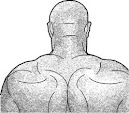
..should we make a sound? Of course we should. We owe our children that much.
As my man Reggie Warrington [Dave Chappelle] told Buddy Love [Eddie Murphy] in the
Nutty Professor; "it's time to attack black."So here we go again. It seems like every now and then I have to go on one of these rants. My Killadelphia murder count on the sidebar of this blog is not enough. Black folks, unfortunately, have become numb to the senseless killing of our children
by our children. So what if three more young men were murdered this past week in Philly? Or if well over thirty school aged children have been murdered in
Chicago this year? (How come Oprah doesn't have a show about that? I guess Dr. Phil doesn't do grief counseling) We have come to
expect it.
But every now and then there is a murder that shocks our collective conscience and plays itself into the national psyche. Instead of a line or two in the metro page of the local paper, it makes national news. Bryan Williams is talking about it, and middle A-merry-cas is watching it with their hands over their mouths. In the hood people are wondering what's the big deal. How come this one made the national news and all the others didn't?

Well maybe it's because this one played itself out on video like a twisted reality television show for all of us to see. -And in the president's hometown no less- Urban terrorist beating a young honor student to death. No remorse, no heart, and no hesitation. Like a pack of animals who have strayed far away from their human DNA. You have all seen the
video by now. If you haven't maybe you should. And when you do, take a long hard look at those those urban terrorist and try to find something. Maybe a clue as to why they act the way that they do. Something. Anything. I looked. In fact, I am
always looking.
Here is what I see whenever
I look: Children-wait, I take that back;
boys without fathers. Young men with no men in their lives. Young men being raised by the streets and all sorts of negative influences. Most of them are here compliments of some sperm donor who just kept getting up. Absent fathers who thought that mom had a fat ass and was a "hell a nice shot".
I never see those sperm donors in criminal court when the cases are being called and the defendant's are being led into the courtroom. Only girlfriends, grandmothers, and mothers. The only black males I see in the court rooms are the sheriffs. When I go into the home of a potential client, the only people I negotiate with are mothers and grandmothers. Again, there is never a sperm donor in sight. That is
my reality, and it's better than any scientific study you can cook up from some fancy Ivy League school.
Oh field, stop it, what do you expect these men to do? What about the women who hook up with them? What about them? I can't speak for the women. All I know is that more often or not she is the one left to raise the child by herself. The sperm donor is always long gone and nowhere around. Regardless of who zoomed who.
I am so sick of seeing the vigils, the teddy bears, and the prayer groups in front of crime scenes. Because the sad reality is that tomorrow, just like clockwork, some poor child will be snatched from us by an urban terrorist all over again.
Today, Al Sharpton,Newt Gingrich, and Education Secretary, Arne Duncan, toured the schools here
in Philly.
(Talk about strange bedfellows)They were here to praise the charter school system in our fine city and push for longer hours in school. That's all fine. But our schools could stay open twenty four hours a day and it wouldn't make a damn difference to the urban terrorist out here. The kids who want to learn will be there, and the others will keep doing what they are doing now: be disruptive, make it harder for the other kids, and create a poor overall learning environment.
But let's keep it real with each other. The schools can only do so much. Everything starts at home.
I know that I am preaching to the choir here, because most of you who read this blog with children don't need to here this. I am sure that
your children are fine. But what about the rest of them? All of our children. A-merry-ca's children.
(Well, black A-merry-ca's children, because I am quite sure that the rest of A-merry-ca would never claim them. They would much rather adopt a nice little Asian or Russian girl...let me stop.) How do we get to
them? How do we stop the sperm donors? It's, for the most part, a question that is orotund in nature. Because as much as I have tried to figure it out, I swear that I don't know the answer.









































